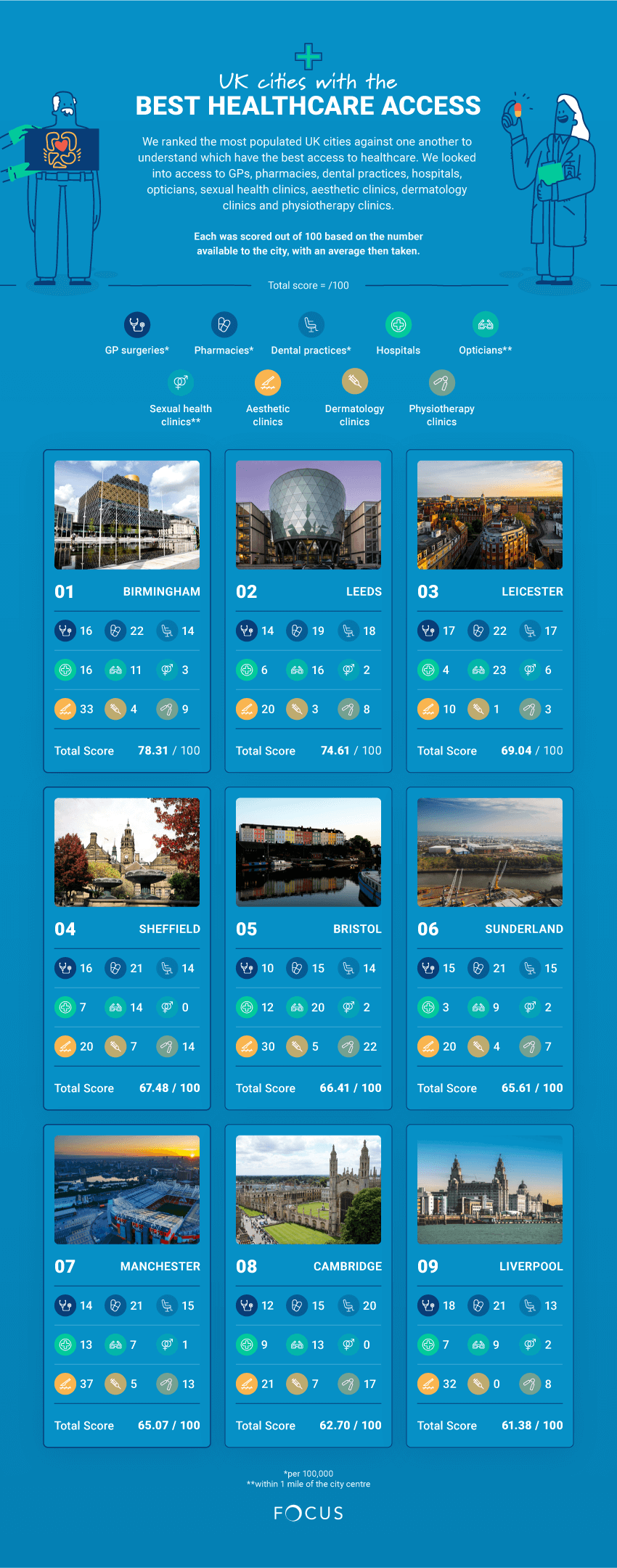As of June 2025, the average waiting time for planned hospital treatment had almost doubled, reaching 13 weeks, a big jump from 6 years ago in 2019, when it was recorded at 7.5 weeks. So, the need for building, opening and planning new healthcare facilities is now a national emergency.
It was also recorded that in July this year, nearly a quarter of patients (23.6%) waited over four hours in A&E, with more than 35,000 experiencing wait times over 12 hours [sources: Nuffield Trust, BMA].
With this in mind, we decided to look into which UK cities offer residents significantly better access to key healthcare services. Our research looked into data on the number of hospitals, pharmacies, GPs, and specialists to reveal which are the most accessible.
Key takeaways:
- Birmingham tops the list of UK cities for healthcare
- Bexley, Crawley and Reading rank as the worst three in the UK, closely followed by Slough and Swindon
- Leicester is home to the highest number of opticians within a 1-mile radius of the city centre, at 23
- Birmingham (16) has the most hospitals, with Manchester (13) in second and Bristol (12) in third
- Liverpool, York and Wolverhampton all offer the highest number of GP surgeries per 100,000 residents (18)
- When looking at dental practices, Cambridge has the most to offer, with 20 per 100,000 residents
The top cities for healthcare access
To find the best cities for healthcare access, we ranked the most populated UK cities against one another. We looked into access to GPs, pharmacies, dental practices, hospitals, opticians, sexual health clinics, aesthetic clinics, dermatology clinics and physiotherapy clinics. Each was scored out of 100 based on the number available to the city, with an average then taken.

1. Birmingham (Total Score: 78.31)
Birmingham tops our list, providing excellent access to a wide range of services. With the highest number of hospitals (16), the highest number of pharmacies (22) and above average in GP surgeries (16 per 100,000 people), Birmingham residents have a wealth of options for care. The city also scored highly for its number of specialist clinics, ensuring a holistic approach to health.
2. Leeds (Total Score: 74.61)
Leeds stands out for its well-rounded performance, ranking second overall. The city boasts a high number of dental practices (18 per 100,000 people) and is home to a good number of opticians within 1 mile of the city centre. This broad availability of services contributes to its high ranking.
3. Leicester (Total Score: 69.04)
Taking the third spot is Leicester. The city offers a good number of GP surgeries (17) and pharmacies (22) per capita. The city also has the highest number of opticians within a mile of the city centre, making it easy for residents to access essential eye care.
4. Sheffield (Total Score: 67.48)
Sheffield ranks highly due to its strong performance across several categories. The city scores fairly well in terms of the number of hospitals per 100,000 residents (7), with a high number of dermatology and physiotherapy clinics, thereby providing residents with good access to both general and specialised care.
5. Bristol (Total Score: 66.41)
Rounding out our top five, Bristol is a great city for healthcare access, particularly for specialist services. It has a high number of hospitals and receives top scores for its extensive network of physiotherapy clinics (the highest number of all cities) and eye care clinics.
The worst cities for healthcare access
| Rank | City | Access score |
|---|---|---|
| 1 | Bexley | 15.83 |
| 2 | Crawley | 20.08 |
| 3 | Reading | 22.20 |
| 4 | Slough | 22.26 |
| 5 | Swindon | 26.84 |
| 6 | Ipswich | 28.62 |
| 7 | Plymouth | 28.76 |
| 8 | Luton | 30.14 |
| 9 | Bournemouth | 31.86 |
| 10 | Kingston upon Hull | 32.30 |
When looking at the worst cities for healthcare access, we found that Bexley ranked last, with a score of 15.83 out of 100.
Bexley is let down by its lack of specialist centres, with the number of sexual health, aesthetic and dermatology clinics well below average. It also offers just 11 GP surgeries per 100,000 – significantly down compared to the rest of the cities.
All of the lowest-rated cities also scored poorly in the number of opticians within 1 mile of the city centre, with Bexley only offering two, Crawley three and Bournemouth 5.
Putting health within reach
Our research demonstrates that not all UK cities can offer the same levels of healthcare access – a problem that, in the modern day, needs to be addressed.
Access to healthcare isn’t only about convenience; it’s a necessity and plays a huge role in the speed of treatment, early detection of illnesses, and overall quality of life. The cities that prioritise healthcare accessibility are able to give residents a real advantage, supporting their future health.
If you’re planning to move to a new location, understanding your healthcare access may impact your decision.

